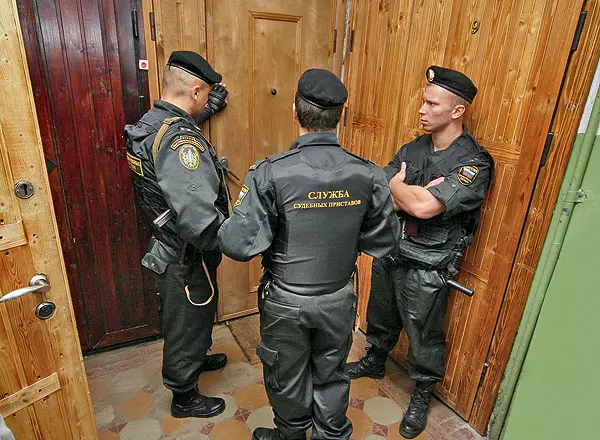The right of housing is guaranteed by the Constitution of the Russian Federation, however, there are cases when it may be violated on legal grounds

My home is my fortress, isn't it? We set iron doors, buy reliable locks (approximately the same as in bank safes), closing the windows with lattices - do everything so that uninvited guests cannot get into our home. There is, however, cases where such an invasion is justified - it is about them to talk today.

Russian Lookstate 25 Constitution of the Russian Federation reads: "The home is inviolated. No one has the right to penetrate the dwelling against the will of those living in him otherwise as in cases established by the Federal Law, or on the basis of a court decision. "
Insectention means that persons living in it are prohibited against the will. People are extraneous (and representatives of any organizations, and just neighbors) can cross the threshold, only if the inhabitants of this room express agree to this. In addition, the violation of inviolability is the placement in the residential premises of special technical means for audiovisual observation, the eviction of a citizen from the legally occupied housing (if there is no foundation), the temporary use of the residential premises in the absence of the one who lives in it (the purpose of the value has no).
We draw your attention to the fact that the penetration of housing in order to the embezzlement of property in it (that is, the theft) is an independent crime. Therefore, although the integrity of the dwelling and broken, the attacker is responsible only for theft.
The principle of inviolability is also applied to housing, and for a temporary refuge, a hotel room, a room in a sanatorium, a pension or holiday home, camping, the ward of hospitals and other medical institutions, that is, on all rooms in which a person lives constantly or temporarily. However, this rule is not valid for the workplace.
Non-primary property
In order to obtain a more complete picture of the inviolability of housing non-property constitutional law, belonging to each person, we will consider two concepts: "dwelling" and "living in the dwelling".The housing is the place of residence of a person, it follows from the word. However, the question arises: will the housing be, for example, a hostel or hotel? The answer is unequivocal. To protect the rights of the individual, the legislator included in the concept of "housing" and the place of stay of people. Therefore, the hotel administrator may unauthorized to go to your hotel room only if you break the rules of accommodation (the same goes for the conductor of the train and your separate coupe). Avota with the fact that your room will include a maid to make cleaning, you agree, signing a contract with the hotel.
Thus, the principle of inviolability applies to any residential premises (residential building, apartment, hostel, hotel IDR), in which a citizen constantly or temporarily lives as a owner, under the employment contract (delivery), lease agreement, or on other grounds provided for by law Russian Federation. The inviolability of the home does not depend on whether the room has people living in it on the right of ownership, or they rented it by the owner (another person or the municipality), or it was allocated to them as a service housing.
It is important to know that in legal attitude to the dwelling, vehicles that are in private property or only in possession and use of citizens, garages (regardless of their location), a separate coupe in a train or a separate cabin on a ship adjacent to the house of land plots (with Conditions that they can be unmistakably deliberate from the surrounding area). But economic buildings (for example, srates, cellar, barn) separated from residential and not intended to live in people, do not include the dwelling category.
Now we should clarify the second concept, "living in the dwelling on the legal basis of citizens", while determining its content. Legal bases of residence suggest that the person has either the right of ownership (that is, it is the sole owner or co-owner of housing), or the right to use housing on a legitimate basis (uses a residential premises under the lease agreement, hiring or verified). Thus, those who took residential premises with the unlawful ways are permissible in the event of an university without an order to the liberated apartment from the Foundation of Municipal Housing or unauthorized construction of a house on Earth owned by another person - cannot count on the inviolability of this dwelling.
There are some subtleties. For example, in Russian legislation there is a two-way approach to the dissemination of the principle of inviolability of the workplace. The sides, it does not automatically fall under the category "housing", because they do not live there. Sociality is also possible: a person uses his apartment as a place of work. In this case, of course, the principle of inviolability is valid for such a "worker-residential" premises.
Legal violators
There are situations in which the violation of the housing is justified from the point of view of the law. If foreign people fall into your accommodation to eliminate the danger that threatens the interests of the state, society or personality (that is, under action in conditions of extreme necessity), such a violation of the housing is not a crime. One of the possible examples, firewall officers find themselves in the apartment to put out the fire. However, in conditions of extreme necessity there is a very important feature: the harm caused by penetration into the dwelling should be less than prevented damage.
Prepress the occurrence of abnormal situations is extremely difficult. (Suddenly, while you are at home, the apartment will burst the pipe and will fool those who live near?) But to minimize the damage can be to exchange telephones with neighbors and leave spare keys to relatives or friends. Then you do not have to open the entrance door, and they will look at things.
In addition, you are entitled to visit representatives of organizations that ensure the operation of communications at home (for example, for inspection and control of the state of gas pipes and valves), or employees of dispensing, to verify the testimony of intra-ordinary metering devices (which is especially true for apartment owners who have established individual counters of cold and hot water). In this case, the time of visit usually stipulates in advance, most often through ads or sending the appropriate notice by mail. It is worth keeping in mind: Metropolitan communal services, seriously concerned that they cannot verify the state of gas pipes in the metropolis (and this for quite objective reasons can cause various troubles), asked the initiative to the Moscow City Duma. Perhaps now Muscovites (and after them most likely, the inhabitants of other cities) will have to be recorded on the scheduled inspection of gas equipment. In the opposite, as communal service workers say, they will need to acquire special equipment that will allow you to open the doors.
Secondary law enforcement officers are committed by the Posnovinal legislative violations of housing. All situations in which penetration into residential premises without the consent of people living there is enshrined in federal laws.
Housing inviolability may violate:
law enforcement officers who, to fulfill obligations assigned to them, have the right to enter into unhindered in residential premises of citizens and inspect them when the persecution of persons suspected of committing crimes, or in the presence of sufficient grounds to believe that there is committed or a crime occurred or committed, and an accident occurred also to provide personal and public security in disasters, accidents, mass riots;
Bailiffs (bailiffs), who have the right to enter the residential premises occupied by the debtor, to impose arrest on property, withdrawing certain objects or evicting tenants due to a court decision. Executive actions must be held on working days from 06.00 to 22.00. The execution of executive actions in non-working days is permissible, but only if the implementation of this procedure does not tolerate the depreciation or do it on the working day does not work according to the fault of the debtor.
The permission to enter the dwelling without the consent of the persons living there give common and military courts. In the event of the need for such actions, authorities authorized to carry out operational-search and investigative measures, send materials to court. Having considered them, the judge makes a motivated resolution, allowing operations related to the penetration into a housing, or refusing it.
If the housing hit was emergency (that is, it was not possible to get permission for such actions in advance), law enforcement officers are obliged to report this to the prosecutor's office as a body that oversees the observance of human rights. For example, an emergency penetration of an apartment may be possible if the police, patrolling at home, hear the cricks about help from there. Another case is the criminal, leaving the persecution of employees of law enforcement, hides in the apartment (its or alien).
Compare to non-compliance with the principle of inviolability of housing, contacting the higher authorities, the prosecutor's office or the court. At the same time, the complainant has the right to demand not only attracting violators to liability, but also compensation for the material damage caused by his housing, and moral harm caused to him personally.
Attention, search!

As with the penetration into the dwelling, only in cases that do not endure deposits, a search can be made without a sanction of the prosecutor, but with the subsequent notification of it about this within 24 hours. Including an example of an example: a search without a sanction possible if the police became known that an attacker hides important evidence in his apartment (abducted values or documents) and is able to destroy them.
Search is the investigative effect, which is to find objects or documents that have the importance of evidence in a criminal case; It is produced in order to detect wanted persons. When searching, security officers have the right to open any premises if the owner refuses to voluntarily open them. The ability to open the premises without the consent of the owner suggests that the property may be harm (for example, when compulsory opening a safe or iron entrance door). When conducting a search, one is entitled to be present, in whose room there are these actions, or adult members of his family, and must be present to those who are understood. The search results are entered into the protocol, a copy of the document is awarded to a person who has been searched.
Can they evict?
This problem has another aspect: can the housing man deprive? There is the principle of the inadmissibility of arbitrary deprivation of housing: "No one cannot be evicted or limited in the right of use of housing (including in obtaining utilities) otherwise, as on the grounds and in the manner provided by law."
Russian housing legislation provides for the possibility of evicting a citizen from the premises held under a social hiring agreement. However, it is only by court decision. The reason to appeal to the court can be:
Using the tenant or members of his family of residential premises is not as appointed (for example, if the apartment was arranged by a bever-powered);
Systematic violation by the tenant or members of his family of rights and legitimate interests of neighbors (the rooster on the balcony wakes in the mornings of others);
The misstanding appeal of the tenant or members of his family with residential premises, as a result of which the latter is destroyed or damaged (walls and floors in the apartment are spoiled by mini-bowling or the tenant made unauthorized redevelopment).
The right of housing is not applied to those who built their accommodation albeit on their own land, but without proper permit, or on Earth, not intended for construction (for example, on the designated for engineering communications).
If such a tenant's actions became known to the hip, the owner of the residential premises is obliged to document them, making the appropriate report. Of course, they collect testimony and neighbors affected by the actions of the negligent employer, and representatives of the services responsible for the operation and maintenance of housing. We also need an explanation of the culprit of the incident, and here should once again recall the principle of housing integrity. Representatives of the Moderator will be able to get into the residential premises, coming to an agreement with the employer either by having received a court permission to enter housing without the consent of those living there. In love case, the hip must warn the tenant for the inadmissibility of violations and the need to restore the destroyed and spoiled. If at the specified term of the consequence, the offense will not be eliminated, the lodger has the right to apply to the court with a claim for eviction. The employer recognized as guilty is subject to eviction in court without providing other housing. Eviction is possible in the event that the social hiring agreement is dissolved due to the fact that the rent and utility payments are not made for 6 months and more. However, we are confident that such a development of events to our law-abiding readers does not threaten.
